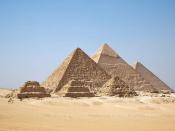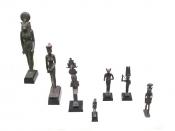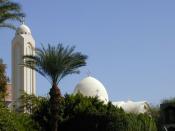Egyptian Gods & Religion
The Greek historian Herodotus (500 BCE) stated:
Of all the nations of the world, the Egyptians are the happiest, healthiest and most religious.
The scenes of daily activities, found inside Egyptian tombs, show a strong continuous link between the earth and heavens. The scenes provide graphical illustration of all their activities: hunting, fishing, agriculture, law courts, and all kinds of arts and crafts. Portraying these daily activities, in the presence of the Gods.
Every action, no matter how routine, but in some way had a cosmic connection: plowing, brewing, building ships, wars, playing games--all were viewed as earthly symbols for divine activities.
In Egypt, what we now call religion did not even need a name. For them, there was no apparent difference between sacred and everyday. All the Egyptian's knowledge was based on a cosmic connection that was set into their daily practices, which then became traditions.
Every Egyptian creation text begins with the same basic belief that before the beginning of things, there was a prehistoric abyss--everywhere, endless, and without boundaries or directions.
When it comes to the deeply religious people of Egypt, the creation of the universe was not a physical event that just happened. It was an orderly event that was pre-planned and happened according to a Divine Law that governs the physical and metaphysical worlds.
According to the Egyptian philosophy, man is born mortal but contains within himself the seed of the divine. His purpose in this life is to nourish that seed, and his reward is eternal life, where he will reunite with his divine origin. The whole message of the Egyptian metaphysical beliefs is that man is created to accomplish a certain role. According to Egyptian traditions, one cannot succeed in earthly life merely by default. One must use...


